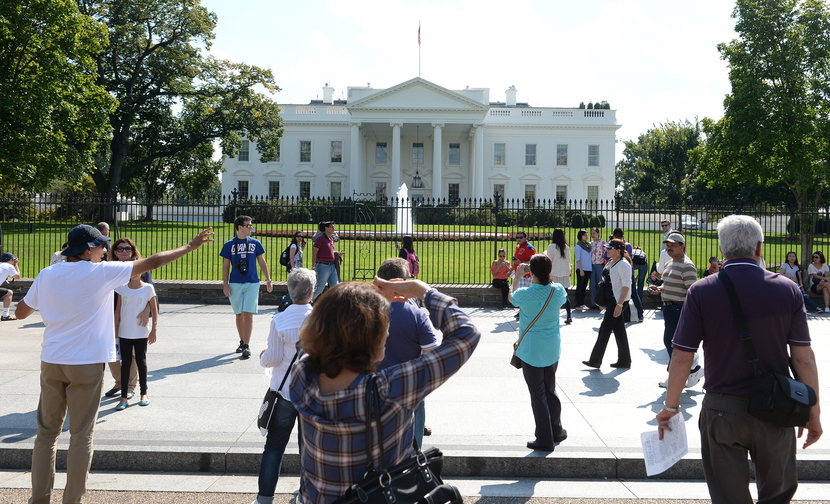WASHINGTON — The political impasse that shuttered the federal government at midnight Monday spilled into its first weekend showing no signs of abating, leaving hundreds of thousands of federal workers on furlough and museums and national parks across the country closed.
House Republican leaders and the White House sought to reassure those furloughed federal workers that they will be paid when the shutdown ends, but resolving the crisis remains a politically difficult task because both sides see broader strategic implications to the outcome.
The Republican decision to attach the language to defund or delay the Affordable Care Act to the stalled spending resolution was a tactical one pushed by conservatives, who think that the spending bills represent their moment of greatest leverage with President Obama.
On the other hand, the president and his Democratic allies in Congress are hoping to turn back the clock to a time before Washington was not constantly on the brink of fiscal meltdown.
After nearly three years of jumping from fiscal crisis to fiscal crisis, Democrats want to establish a different order. They would like to make temporary funding bills, such as the one the Senate passed last week to keep the government funded, and regular increases to the debt ceiling perfunctory matters that are routinely approved without bringing Washington to the brink of disaster each time.
But tea-party-backed members leading the fight against the health-care law say they came to Washington to disrupt the routine.
Obama and congressional Democratic leaders have refused to engage in any negotiations thus far, saying that they do not want to establish a precedent that the party controlling just one chamber of Congress could hold hostage basic legislative functions in exchange for political ransom.
Instead, Democrats have said they will only consider broader budget talks, including some tax and entitlement reforms and relief from automatic spending caps, once Speaker John Boehner, R-Ohio, and the House approves a resolution that funds government operations and ends the shutdown.
“Once the government reopens and we get the debt ceiling settled, we’ll be happy to talk to them about anything they want to talk about,” Senate Majority Leader Harry Reid, D-Nev., told reporters Friday.
Hours before Reid spoke, Boehner reiterated Republican demands that Obama must negotiate with them on both funding levels for federal agencies and the pending Oct. 17 deadline when the Treasury will lose its ability to continue borrowing money to finance the federal government.
“This isn’t some damn game. All we want is to sit down and have a discussion,” Boehner angrily told reporters Friday.
Republicans cite a long history of presidents signing legislation lifting the debt ceiling that was the negotiated result of talk between the White House and Congress.
At stake now is a government shutdown that could soon become one of the longest in history, and, more important to global financial markets, a possible default on the nation’s $16.7 trillion debt.
House Majority Leader Eric Cantor, R-Va., said Friday that the House will vote this weekend on legislation to provide back pay to federal workers who have been furloughed during the government shutdown. Cantor made the announcement as civil servants rallied outside the Capitol to end the closure. The vote will take place Saturday, according to Cantor’s office.
Boehner and Cantor had for weeks been counseling their rank and file against a government shutdown, fearing that most of the political blame would fall on Republicans. But, now that they are several days into the shutdown, Republican leaders have instead opted to use the reopening of federal agencies as its own bargaining chip in what they want to be a broader set of talks.
Despite the heated talk about gutting the health-care law, Republicans have been quietly trying to coalesce around a set of goals that could win support from Democrats in a bipartisan pact that would resolve the annual spending bills and increase the debt ceiling. In exchange for lifting the debt ceiling, the possibilities floated include smaller cuts to the health law, including repeal of a tax on medical devices that funds a portion of the law but is unpopular even among many Democrats. Also, Republicans might push for a repeal of a medical advisory board that conservative critics have called a “death panel.”
Most likely, Republicans want to focus on reforms to entitlements, including a change in how the inflation index is measured for adjustments to Social Security benefits, and some other tweaks to mandatory spending. If those were adopted, Republican advisers said, it would pave the way for relief from the automatic cuts imposed by the 2011 Budget Control Act.
All of this could be accompanied by vague language calling for the tax-writing committees in Congress to engage in a rewrite of the tax code.
After initial fears that Boehner was restarting talks of a “grand bargain,” most Republicans left a Friday morning Republican huddle understanding that their leaders were trying to merge two big issues into one solution.
But Democrats are adamant that they will not take up such a broad agenda in the days ahead, heightening the chances of a prolonged shutdown as well as a default.
Obama, visiting a Taylor Gourmet sandwich shop for lunch near the White House with Vice President Joe Biden, said the shutdown could end in 30 minutes if Boehner would approve the Senate-passed funding bill, which has no restrictions to the health law. He also dismissed a background quote in The Wall Street Journal attributed to a senior White House official that Democrats were “winning” the showdown.
“As long as they’re off the job, nobody’s winning, and that’s the point,” Obama said referring to furloughed federal workers. “We should get this over with as soon as possible.”
Reid continued his personal feud with Boehner, whom he accused of going back on his word that the House would avert a shutdown by passing a stopgap funding bill that would pass the Senate. Instead, the Democratic leader said Boehner has given in to his right flank out of fear that passing legislation with Democratic votes would jeopardize his hold on the speaker’s gavel.
“What is more important, our country or a position of leadership?” Reid asked.
Send questions/comments to the editors.



